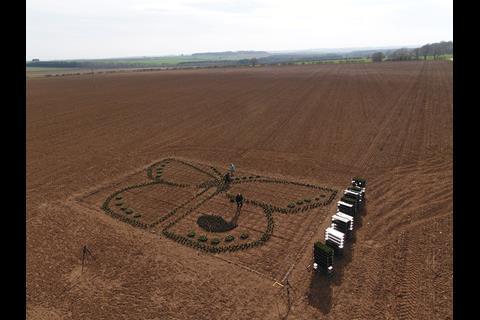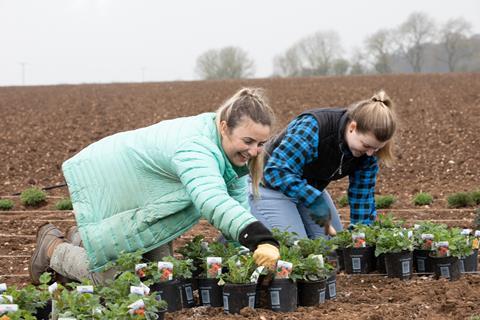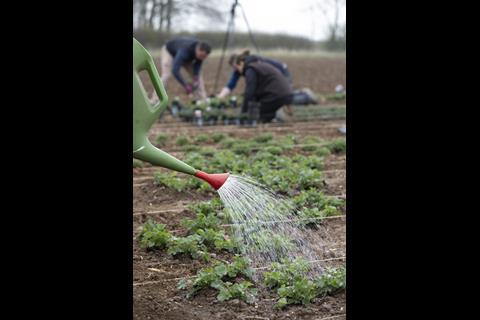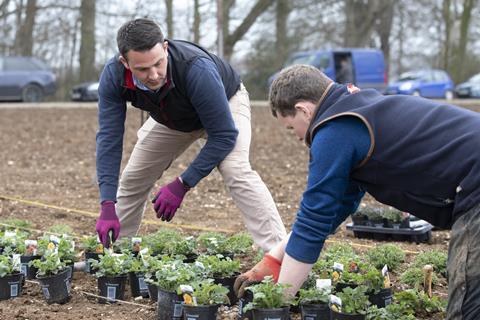Campaign seeks to educate nation on importance of biodiversity and impact of its loss, as well as what we can all do to help protect it, with 20,000 wildflower seed boxes up for grabs
Birds Eye has launched a campaign to boost awareness of the importance of biodiversity through its ranges of peas and petits pois.
The brand’s ‘Peas For Bees’ campaign will run across TV, digital, PR, in store and on pack to educate the nation on the importance of biodiversity and the impact of its loss, as well as what we can all do to help protect it.
The campaign aims to encourage the nation to support biodiversity by growing wildflowers which in turn provide habitats for bees, butterflies and other pollinators. To this end, some 20,000 wildflower seed boxes are up for grabs through an on-pack giveaway competition.
In addition, Birds Eye has pledged to plant 75 acres of wildflowers across the UK in the next three years, in celebration of the 75 years that Birds Eye has been growing peas in North Yorkshire.
The brand has itself planted a huge butterfly artwork at one of its pea farms in the region. The vast sculpture has been carefully crafted and is made up of raked soil seeded with British native wildflowers to provide a food source for bees and butterflies. Birds Eye said it will symbolise the beauty, power and importance of soil.
The native wildflower species will encourage a wide range of pollinating insects and other wildlife to thrive in the area, and the brand wants this to inspire the public to sow their own wildflower seeds.
James Hopwood, head of agriculture operations at Birds Eye, said: “We are committed to playing our part in helping solve the biodiversity crisis.
“Forty per cent of raw materials used by Birds Eye, annually, are now vegetables and potatoes. By constantly creating and improving sustainable and resilient agricultural systems and by continuing to work alongside the farming community who we source these from, we can actually bring back diversity, replenish soil and landscapes and help recover biodiversity loss.”
According to research from the University of Zurich, biodiversity loss globally is currently estimated to be 100 to 1,000 times higher than the naturally occurring background extinction rate.
It is estimated that the global population will reach almost 10 billion by 2050. In order for the planet to feed this many mouths, Birds eye stressed that sourcing food sustainably – in a way that actively replenishes rather than destroys biodiversity – is critical since biodiversity provides us with clean air, fresh water, good quality soil, and crop pollination.
Research suggests that agriculture is currently responsible for 60 per cent of global biodiversity loss and 82 per cent of people internationally believe companies have a moral obligation to protect it, according to the 2020 UEBT Biodiversity Barometer.
Giving her backing to the Birds Eye campaign, TV gardener and presenter Daisy Payne added: “The past year has been huge for gardening! More people than ever before are embracing gardening and there’s a whole new generation getting into it.
“In fact, according to a survey from the Horticultural Trades Association, the first lockdown created three million new gardeners. This is brilliant news for biodiversity because lots of us can contribute to preserving green spaces in our own local communities.”
“It’s great that Birds Eye’s farming practices support biodiversity and even better that they’re encouraging us all to get planting.”
Her tips for how people can help protect biodiversity in their day-to-day lives are as follows:
Keep it native: try to use plants that will encourage a wide range of pollinating insects and other wildlife.
Go wild: if you have a garden, allow a small area to grow ‘wild’, or leave a patch of fallen leaves. Insects, birds and small mammals will benefit from the cover and native plants.
Tree planter: if you don’t have access to a garden or outdoor space, look out for a tree down your street. They often have soil at the base so you can grow the Birds Eye wildflower seeds there quite easily.
Inspire the future: Get children involved in gardening activities – inspiring future generations to love and respect wildlife is the best way to protect nature in the long-term.
Know the source: When buying foods, take a look at what the manufacturers are doing to support sustainability. You can do this by looking at their website or on the pac







